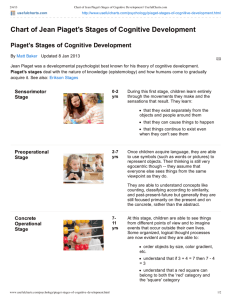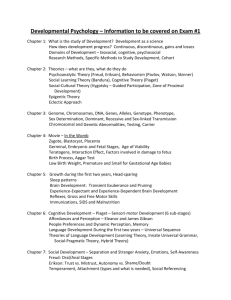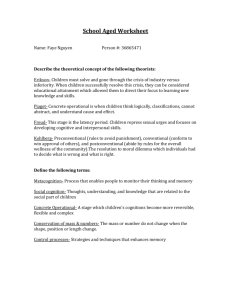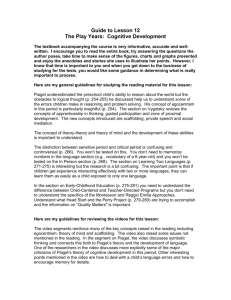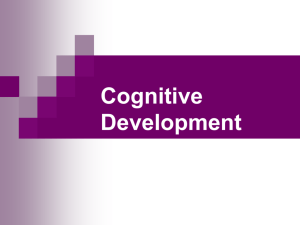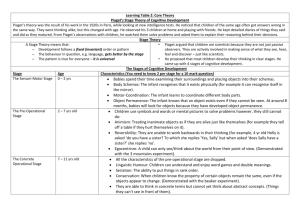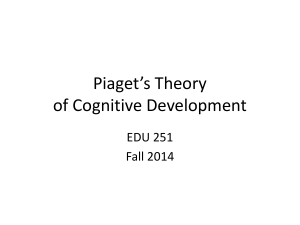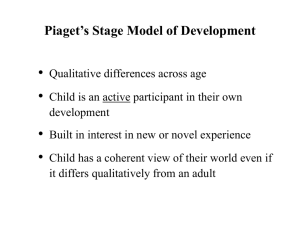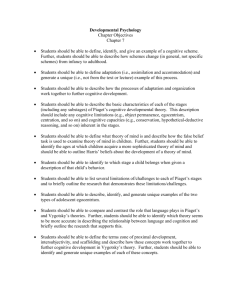File - Wendy Valenzuela
advertisement
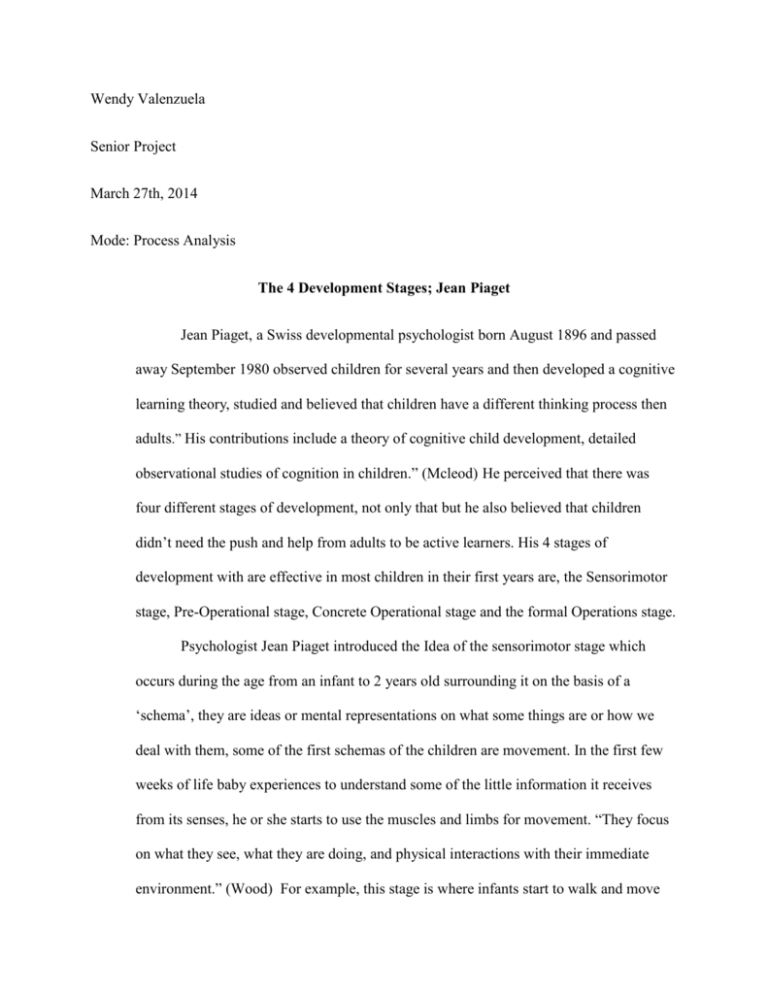
Wendy Valenzuela Senior Project March 27th, 2014 Mode: Process Analysis The 4 Development Stages; Jean Piaget Jean Piaget, a Swiss developmental psychologist born August 1896 and passed away September 1980 observed children for several years and then developed a cognitive learning theory, studied and believed that children have a different thinking process then adults.” His contributions include a theory of cognitive child development, detailed observational studies of cognition in children.” (Mcleod) He perceived that there was four different stages of development, not only that but he also believed that children didn’t need the push and help from adults to be active learners. His 4 stages of development with are effective in most children in their first years are, the Sensorimotor stage, Pre-Operational stage, Concrete Operational stage and the formal Operations stage. Psychologist Jean Piaget introduced the Idea of the sensorimotor stage which occurs during the age from an infant to 2 years old surrounding it on the basis of a ‘schema’, they are ideas or mental representations on what some things are or how we deal with them, some of the first schemas of the children are movement. In the first few weeks of life baby experiences to understand some of the little information it receives from its senses, he or she starts to use the muscles and limbs for movement. “They focus on what they see, what they are doing, and physical interactions with their immediate environment.” (Wood) For example, this stage is where infants start to walk and move arms to be able to grab objects or hold up their bottle on their own. One of the main affects that all babies have is that they don’t consider anyone else’s needs wants, or interests, considered as an ego-centric. During the stage the knowledge about objects and the ways that they can be manipulated is required, through information and visual of the world, self and people in it, the infant understands how one thing can cause or affect another, he or she begins to develop simple ideas about time and space. Trial and error experimentations and exploration of objects to determine their properties. Object permanence, big discovery was that when an object is taken from sight babies act as object has ceased to exist this happens by around 12months which is one of the most affective things in this stage. During this stage, young children are able to think about things symbolically, in other words their language expands. They also develop memory and imagination, which allows them to understand the difference between past and future, and engage in make-believe. The second stage is the Pre-Operational stage which is introduced in the ages from 2-7 years old,” characterized by ego-centric thoughts, children cannot adopt alternative viewpoints; they cannot think from another's perspective.” (Cherry) The child will always think that they’re right and that they deserve to get what they want by throwing fits. Children's thought process is devolving although still considered to be far from logical thought in adult sense; their vocabulary also expands and develops during the stage as going from a baby to a toddler. “While they are getting better with language thinking they still tend to think about things in very concrete terms.” (Cherry) In this stage a child also stops believing he or she is the center of the world and can imagine something or someone else is the center of attention. “Animism” is comes along in the stage, this is when a person has the belief that everything existing has a consciousness. For example they believe that a doll has a heart or that a piece of wood can walk. Reasons for this is that the Pre-Operational child often assumes that everyone and everything is like them in the terms that it has feelings and physically real when being involved in pain, emotions or feelings. The Concrete operational stage starts to kick in from the age of 7-11 years old which is where the thought process becomes more rational, mature, and adult like. This process continues well into the teenage years. Piaget divided process into two stages, the concrete operations and formal operations which mostly undergone by adolescents. In this stage child has ability to develop logical thought about objects where they now don’t think and believe they have feelings. The belief in Animism and ego centric thought tends to decline during the Concrete Operational stage, this way of thinking is usually found in adults. Once child learns to conserve, they learn about ‘reversibility’ which means that they learn that if things are changed they will still be the same as they used to be. They are able to tell the distinction between one’s own and others perspectives also understanding that one’s personal thoughts and feelings can differ from someone else's. For instants they know what consequences are and develop they knowledge or respect at this age, their maturity slowly starts to kick in. A child basically develops the ability to think logically, to make generalizations understand the cause and effect, to be able to group and qualify things and realizes reversibility where processes can be cancelled our or reversed. Physical quantities don’t change based on arrangement and or appearance of object, at this time, elementary-age and preadolescent children demonstrate logical, concrete reasoning. Children's thinking becomes less egocentric and they are increasingly aware of external events. They begin to realize that one's own thoughts and feelings are unique and may not be shared by others or may not even be part of reality. Children also develop operational thinking -- the ability to perform reversible mental actions. During this stage, however, most children still can't tackle a problem with several variables in a systematic way. The last stage that marks the growth and maturity at times is the Formal Operational stage which happens from the ages of 12-16 or up. Proportional reasoning is the ability to draw logical conclusions about abstract and hypothetical ideas and situations. It is conceptual understanding of fractions; percentages, and ratios, idealism is the capacity to imagine alternatives to current social and political practices. Adolescents who reach this fourth stage of intellectual development are able to logically use symbols related to abstract concepts, such as algebra and science. They can think about multiple variables in systematic ways, formulate hypotheses, and consider possibilities. They also can ponder abstract relationships and concepts such as justice. Their social knowledge in making friends and having s stronger personality evolves, they comprehend the idea on how to be nice and know how to act around friends and adults. Although Piaget believed in lifelong intellectual development, he insisted that the formal operational stage is the final stage of cognitive development, and that continued intellectual development in adults depends on the accumulation of knowledge. These stages are significant to the world of a child, they describe the way they develop their brain and emotions and define how their mind set differ from adults. In most cases these stages have been proven right due to the longitudinal studies of Jean Piaget. These stages help people understand why some infants, toddlers or teenagers due the things they do, they understand that they don’t think the same as adults and that every stage in life takes time. Wood K. "Children's Health." Piaget Cognitive Stages of Development. N.p., n.d. Web. 24 Sept. 2013. "4 Cognitive Stages for Child Development." 4 Cognitive Stages for Child Development. N.p., n.d. Web. 24 Sept. 2013. "Piaget’s 4 Stages of Cognitive Development." Piaget’s 4 Stages of Cognitive Development. N.p., n.d. Web. 24 Sept. 2013. Kendra Cherry "Stages of Development." Stages of Development. N.p., n.d. Web. 24 Sept. 2013. Mcleod "Jean Piaget." Simply Psychology. N.p., n.d. Web. 24 Sept. 2013. Kendra Cherry “Piaget's Stages." Cognitive Development Summary Chart. N.p., n.d. Web. 27 Sept. 2013.”
